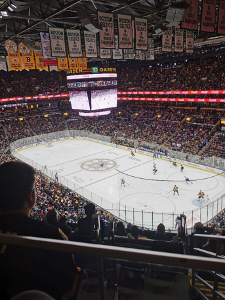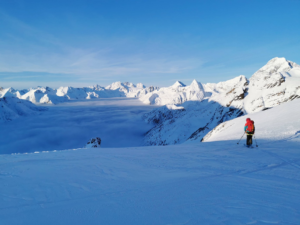Last winter I was able to spend 6 months at the Daniel Segrè lab at Boston University thanks to financial support from NORBIS and SINTEF. I arrived on October 1st 2019, in time to enjoy the fall season with beautiful colors, nice weather and good opportunities to explore Boston.
Because I found it difficult to decide on a long-term housing option prior to my arrival I spent the first 10 days in an AirBnB that was a bit too far from the city center. Due to the extreme number of Universities in Boston housing is very expensive, and it was difficult to find something that was acceptable with respect to price and standard. After nearly being scammed twice in my effort to find an apartment on craigslist, I finally found a reasonable long-term flat through https://junehomes.com/ that I shared with 5 other. This worked surprisingly well.
Figure 1: Watching Boston Bruins beat Vancouver Canucks at TD garden.
Daniel Segrè hosts a moderately sized group (8 PhDs and 2 researchers) that works both experimental and computational aspects of microbes and microbial interactions. The quality of their work was impressive and it was very motivating to collaborate closely with these people. I learnt a lot of microbiology and ecology from the group meetings and journal clubs. Another cool aspect of working at Boston University is the proximity to other top-notch research institutions and therefore easy access a lot of relevant conferences, meetings or other research groups. To get the most out of my research stay I wanted engage in their ongoing projects and I ended up studying the fascinating phototrophic marine bacteria Prochlorococcus (preprint on BioRxiv) using an updated genome-scale metabolic model. To understand how the metabolism of Prochlorococcus is affected by nutrient limitations and diel cycles we simulated growth using COMETS. To facilitate these simulations we developed light absorption and time-dependent light availability as new features in COMETS (read about the recent COMETS release on arXiv).
My research stay ended abruptly with the arrival of covid-19, but I was satisfied with my stay. I can highly recommend a research exchange to Boston. I addition to great science, Boston also offers an active running community and reasonable access to (disappointing) skiing in winter. The public transport is average, the traffic is one of the worst in US, but the city is small enough that you can easily bike anywhere. By a refurbished race bike at https://bikesnotbombs.org/ if you want to get the most out of your stay.
Figure 2: There is also good skiing in North America, but not close to Boston.

